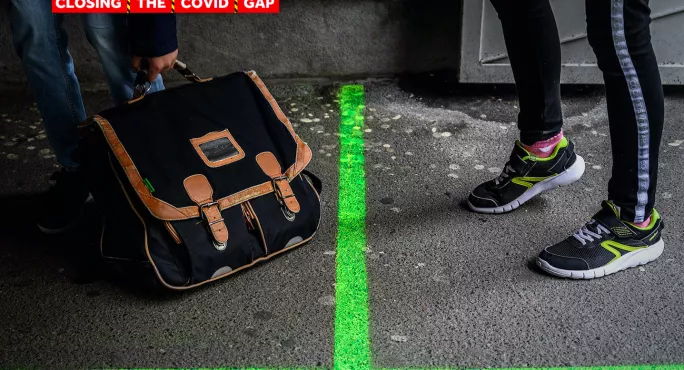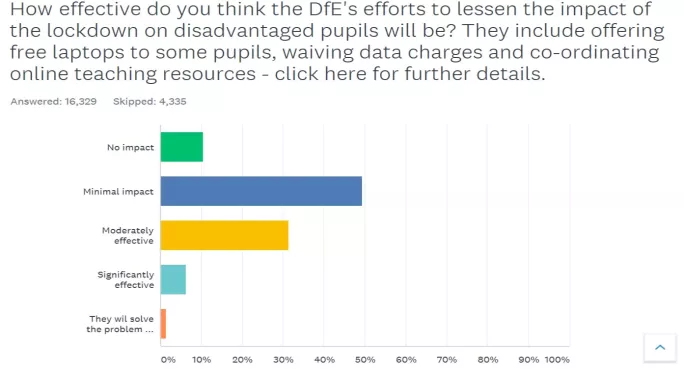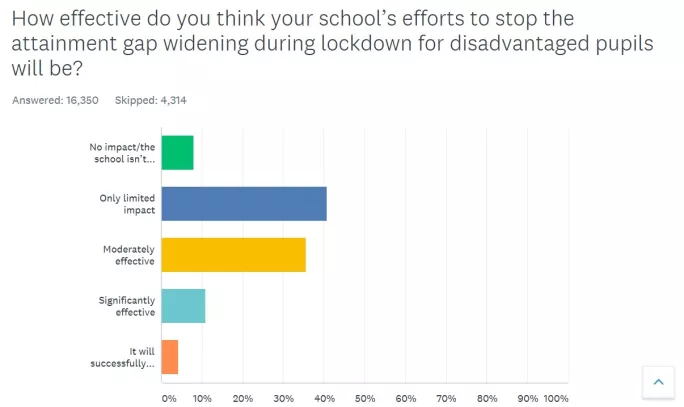- Home
- DfE lockdown help for poorer pupils ‘has little impact’
DfE lockdown help for poorer pupils ‘has little impact’

Almost 60 per cent of teachers and support staff think the Department for Education’s efforts to lessen the effect of lockdown on disadvantaged pupils has had minimal or no impact.
DfE measures have included offering free laptops to some pupils as well as waiving data charges and coordinating online teaching resources.
However a Tes survey of more than 16,000 school staff across the UK found that 10 per cent believe the measures will have no impact, and 49 per cent said they would have only minimal impact.
Exclusive: Covid-19 widens disadvantaged gap to a gulf
Related: Free laptops not guaranteed before schools reopen
Background: Free laptops for disadvantaged pupils
Nearly a third believe the achievement gap has now widened to a ‘gulf’.
The findings come as Tes begins a series of Closing the Covid gap reports on the challenges faced by schools in helping vulnerable and disadvantaged pupils catch up as they come out of lockdown.
Prior to lockdown, research by the Education Policy Institute found the learning gap was the equivalent to 18 months’ development for a 16-year-old disadvantaged student, and just over nine months’ for a pupil leaving primary school.
One teacher said in the survey: “The government allocations [of computer devices] are about 25 per cent of what we actually need so we have to appeal for the rest.”

Another said: “The problem cannot be solved merely by laptops and data. They need much more than this. Children living in cramped or temporary accommodation with one parent or a parent who is sick, working full time at home or a key worker will not be able to have the support they need”.
The survey, carried out during lockdown, also reveals that only 4 per cent of school staff think their school has succeeded in doing enough to prevent partial school closures “from causing disadvantaged pupils to fall further behind”.
One teacher said: “There is only so much we can do because staff are also dealing with difficult circumstances and are having to learn to teach in new ways. We are trying to help the most disadvantaged children but if their parents are not responding to attempts to contact them, there is little we can do.”
Another said: “I think we have done what we can for our students with the limited resources we have available to us but there will be an impact.”

The DfE measures have also included the creation of the online Oak National Academy, which has been offering millions of lessons a week - however, critics say many children are unable to access these online resources.
The free laptops scheme, meanwhile, has been criticised for arriving too late.
One teacher said: “Perhaps slightly cynically, it feels like it [the laptops scheme] is more about diverting attention from the current lack of support for these students than genuine promises to invest in their education in the long term. Schemes like the National Academy are a nice idea but, in all honesty, are really too generic to be able to support learners effectively in my opinion.”
A Department for Education spokesperson said: “We will do whatever we can to make sure no child, whatever their background, falls behind as a result of coronavirus.
“The government has already committed over £100 million to support children to learn at home, and pupil premium funding continues to be paid at the highest ever rate per pupil while schools are closed to help them support their disadvantaged pupils.
“We have set out plans to begin opening schools to more pupils from 1 June at the earliest in line with scientific advice. We are also considering, with a range of partner organisations, what more is required to support all pupils who have been affected by school closures.”
Register with Tes and you can read two free articles every month plus you'll have access to our range of award-winning newsletters.
Keep reading with our special offer!
You’ve reached your limit of free articles this month.
- Unlimited access to all Tes magazine content
- Save your favourite articles and gift them to your colleagues
- Exclusive subscriber-only stories
- Over 200,000 archived articles
- Unlimited access to all Tes magazine content
- Save your favourite articles and gift them to your colleagues
- Exclusive subscriber-only stories
- Over 200,000 archived articles



